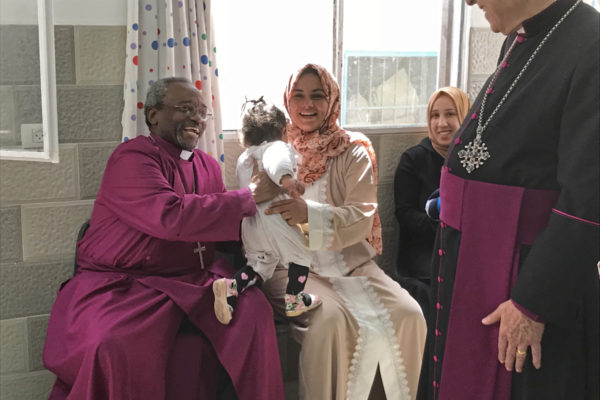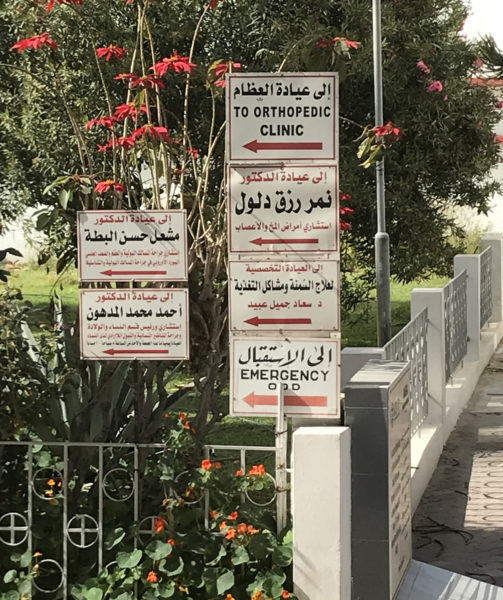‘Living stones’ of Al Ahli Arab Hospital build a ministry of healing, witness in GazaPosted Mar 27, 2018 |
|

Presiding Bishop Michael Curry hands a toddler back to her mother while visiting a session for mothers and their young children at Al Ahli Arab Hospital in Gaza City. Jerusalem Archbishop Suheil Dawani is at right. Photo: Mary Frances Schjonberg/Episcopal News Service
[Episcopal News Service – Gaza City] Healing comes in many forms, and Al Ahli Arab Hospital’s medical ministry combines every day with Christian witness to provide the people of the Gaza Strip with an example of the love of Christ in action.
That example is set in an area whose Christian population is dwindling. Suhaila Tarazi, the hospital’s director general, estimates there are no more than 900 Christians among Gaza’s 2 million residents. Ten years ago, the number of Christians stood at 3,000 and the total population was around 1.5 million.
Tarazi told Presiding Bishop Michael Curry and his delegation March 26 that the remaining Christians are “the living stones” of Gaza, and so too are institutions like Al Ahli Arab Hospital, which is one of more than 30 social service ministries of the Episcopal Diocese of Jerusalem.
“We try through our mission of healing and love to preserve Christianity,” Tarazi said. “We put our Christianity in action. It’s not talking; it’s not preaching. It’s action.”
Just 12 of the Anglican hospital’s 120 employees are Christian, Tarazi said, but all employees work together and learn how to accept one another and love their neighbors. That work is all to further the hospital’s ministry of healing and reconciliation. The hospital ministers to all, irrespective of race, religion or ability to pay.
“The number of Christians in Gaza are decreasing dramatically, but the witness to the way of Jesus is as strong as ever because at Al Ahli Arab Hospital healing happens – Muslim, Christian, anyone who needs it, healing happens,” Curry told Episcopal News Service after his return to Jerusalem. “And that is the way of Jesus. That is what love looks like. That is what the sacrifice on the cross was about.”

A toddler’s mother shows off her child to visitors at Al Ahli Arab Hospital. Photo: Mary Frances Schjonberg/Episcopal News Service
Curry and staff members who accompanied him met some of the patients and employees and heard about the services that benefit some 38,000 Gaza Strip residents each year. The hospital offers general surgery, general medicine, obstetrics and gynecology, pediatrics and emergency care. People are treated without regard to their financial situation, according to Tarazi.
She said the hospital struggles to survive and do the work of Jesus “in the most difficult and gloomy situation.” A drive from the Israeli border to the hospital shows a city where cars swerve around donkey-drawn carts, and some buildings still show the evidence of mortar strikes from previous fighting.
A statue depicting a large bronze-colored fist rises out of the ground in one small clearing. Placards that appeared to praise men whom residents call freedom fighters and Israelis call terrorists are common sights on street corners. Other placards or murals, including one at the Gaza border crossing, seem to warn residents against becoming traitors by cooperating with Israel.
Rubble piles are common, and some children forage in garbage-strewn lots. Forty-four percent of adults are unemployed, and 33 percent of children suffer from undernourishment or malnutrition, Tarazi said. The hospital sees nearly 700 such children ages 6 months to 3 years via a program designed to monitor their health and teach their mothers about nutrition and other health issues.
Drinking water is polluted, as is the air, according to Dr. Maher Ayyad, medical director. Both communicable diseases and non-communicable ones, such as cancer and hypertension, are on the rise. Ayyad said that, as a Palestinian, he does not like to talk about politics but “my belief is that without America there will never be a solution” to the Israeli-Palestinian conflict. Bringing peace to that area will further peace efforts in the entire Middle East, he said.
“We pray all the time here because, as Christians, we believe in peace. We pray that God will give wisdom to our leaders to have peace in this area.”

Al Ahli Arab Hospital has been ministering as a Christian witness in Gaza City since 1882. The institution was founded by the Church of England’s Church Mission Society and was later run as a medical mission by the Southern Baptist Conference from 1954 to 1982. It then returned to the Anglican Church. Photo: Mary Frances Schjonberg/Episcopal News Service
The hospital’s situation is made more difficult by the restrictions Israel places on Gaza residents, including the movement of medicines and medical supplies, food, fuel and people in and out of the area. Electricity service only works sporadically, and often the hospital must run its 400 kilowatt generator for 16 hours a day. It takes $90 of fuel to power the generator each hour, Tarazi said.

From left, Suhaila Tarazi, Al Ahli Arab Hospital’s director general, and Dr. Maher Ayyad, medical director, explain the ministry of the hospital and the challenges it faces. Photo: Mary Frances Schjonberg/Episcopal News Service
Episcopal Relief & Development helps the hospital with its fuel and food needs.
The hospital is currently struggling in part because of a Trump administration decision in January to withhold $65 million of a $125 million contribution to the United Nations Relief and Works Agency for Palestinian Refugees (UNRWA).
The cut means UNRWA will only pay a fourth of what the hospital expected in reimbursement for the care it gives, according to Tarazi.
If money and supplies are always an issue, vision and ambition are not. For instance, the hospital has a program for early detection of breast cancer among women older than 40. The American Friends of the Episcopal Diocese of Jerusalem and Islamic Relief have helped the hospital obtain a state-of-the-art mammography machine and the equipment needed to read the resulting x-rays. Support also has come from the Australian Anglican Overseas Aid organization.
Education is an important part of the program. That was evident as Curry and his group toured the hospital campus. In a room in the breast-cancer department, hospital employees were teaching a woman in a burka how to do breast self-examination. They were using a rubber device with simulated breasts that fit on the woman’s chest outside of her clothing. There are 800 new breast cancer cases in Gaza each year, Tarazi said.
The breast health education effort is important to increase early diagnosis, according to Tarazi and Ayyad. Otherwise treatment becomes a life-threatening emergency in which time is of the essence. Time moves very slowly in Gaza in those cases. Too often, the combination of aid from the Palestinian Authority and Israeli permission to leave Gaza for treatment cannot be coordinated with available appointments at facilities outside of the area. The Gaza hospital does not have radiation oncology equipment of its own.
Curry’s group, accompanied by Jerusalem Archbishop Suheil Dawani, met a woman who had already had a single mastectomy and now had been told that there was cancer in her other breast. Hospital officials were trying to get her out of Gaza for treatment.
The World Health Organization estimates that only 40 percent of Gazans who need to leave for cancer treatment get permission to do so.
Despite all the difficulties faced by the people of Gaza, Dawani insisted that “we will endure” in order to help that woman and others like her.

Signs in the courtyard of Al Ahli Arab Hospital point patients to various departments. Dr. Maher Ayyad, the hospital’s medical director, says the serene greenery of the courtyard is itself part of the hospital’s ministry. Photo: Mary Frances Schjonberg/Episcopal News Service
Al Ahli Arab Hospital is constantly trying to build partnerships around the world to aid its mission. It is in the early stages of an agreement with Texas-based MD Anderson Cancer Center. The potential $30 million partnership would bring equipment to the hospital and enable the medical staff to consult electronically with MD Anderson doctors on cases. Gaza staff could go through the Texas system for training, as well.
The hospital also has a grant from USAID to build a center for minimally invasive surgery. All staff surgeons will be trained in the technique, and the $900,000 grant will also help purchase the surgical equipment.
Curry was in the third day of a Holy Week pilgrimage to the Holy Land. Previous ENS coverage of his travels can be found here.
The presiding bishop is accompanied by the Rev. Charles Robertson, canon to the presiding bishop for ministry beyond the Episcopal Church; the Rev. Margaret Rose, Episcopal Church deputy for ecumenical and interfaith relations; the Rev. Robert Edmunds, Episcopal Church Middle East partnership officer; and Sharon Jones, Curry’s executive coordinator.
– The Rev. Mary Frances Schjonberg is interim managing editor of the Episcopal News Service.

Social Menu